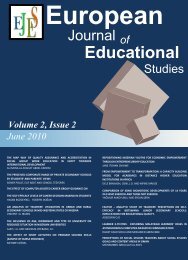Download complate issue - Ozean Publications
Download complate issue - Ozean Publications
Download complate issue - Ozean Publications
- No tags were found...
You also want an ePaper? Increase the reach of your titles
YUMPU automatically turns print PDFs into web optimized ePapers that Google loves.
spoon feed the general reader. This was thought to be undesirable. This was partly due to the influence of theCarnegie Trust, which was firmly behind the establishment of the village centre library.Nevertheless, the service was appreciated and used by those living in the rural areas. The mobile service wasenthusiastically supported by users throughout England. In 1976, it was reported that the mobile library gave a farbetter selection of books to a community, attracted borrowers from a wider cross-section of the population and<strong>issue</strong>d more books than a static village centre library.In the same manner, Gunter (1986) observed that traveling libraries were used to make books accessible to readersin remote villages and hamlets in England. There had been book deposits over the years and boxes of books weresent out to be changed at intervals. However, a greater need was recognized to provide a varied collection to therural areas on a regular basis. This had developed over the years into a modern van service. The van serviceprovided the population of rural England with light reading and substantial amount of reference materials as well.In 1978 a new innovation was introduced to library services in Nigeria. The Rivers State Library Board launched―M. V. Knowledge I‖ on 21 st March, 1978. It was a mobile library operated in a boat. The boat library attractedvisitors from all corners of the country apart from users in the Rivers State who were the primary clientele.The boat had a capacity for 2000 volumes. It could also accommodate two Library Assistants, two Sea-men, aQuartermaster and an Engineering Assistant. Its activities were supervised by a Senior Librarian. ―Three boats wereeventually commissioned to provide library services to the rural areas of the state. The rural areas were divided intothree zones and a boat served each zone. Readers who borrowed books could keep them for a month before theyreturned or renew them because it took up to a month for a boat to go round all the towns in a zone‖ (Yobe,1978).It is clear from the foregoing that wherever a library building is not practical in any community, the bookmobile isan instrument that can be used to extend library services to every nook and cranny of the community to enable allsegments of a society to enjoy library services. A bookmobile can thus be used to introduce library services tounderserved areas and to give continued services to areas that cannot support permanent library buildings in thesociety.The bookmobile should also operate as an integral part of the public library system. The successful bookmobile hasthe same high standard for staff, for book collection and services to be rendered as any other department of thelibrary system. Services such as charging and discharging of books to readers and enrolment of new readers areperformed at bookmobile centres. Bookmobile also includes reference materials among its collection for renderingreference services. Services should be offered at a time convenient to the majority of the people in a given area. It isdesirable to provide services during evening hours. Services on Saturdays may be popular in some communities andshould be scheduled wherever possible.If, however, there is no opportunity of organizing a bookmobile service in a given area, probably as a result ofinaccessibility of the place by easy means of transport, book-boxes should be stationed in centrally located premiseslike schools, churches, mosques and town-hall. In such a situation, a teacher or some other interested andresponsible person should be asked to take care of the lending services.Rural LibrariesUntil the 1940s rural library service was identified with extension services. The first rural services were the travelinglibraries administered by state. They were based on a conviction that rural areas were not able to organize andsupport their own libraries. Any definition of rural library services must include not only libraries in the rural areas,but supporting agencies and extension services as well (DeGrutes, 1980).The history of rural public library services in the United States has been one of constant expansion of services tounserved populations and formation of larger units of services. There are many obstacles which library services inthe rural areas must overcome. They include scattered population and low population density, poor transportationand communication systems, lack of financial resources and lower educational levels than in urban areas.The traveling library of the nineteenth century in the United States was ―a collection of books lent to a communityfor general reading. Its purpose was to provide moral and cultural edification rather than research materials. Thiswas in line with the purpose of small public libraries at that time.‖ There were two types of collections. The first199
















